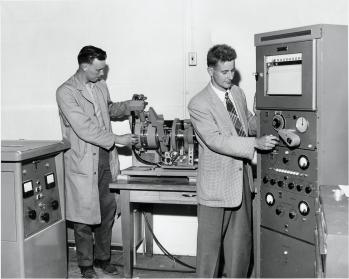
The SRC is the provincial organization dedicated to applying science and technology to Saskatchewan's economic development since 1947. Created to advance development of the province in the physical sciences, SRC has become a market-driven corporation, selling services and products to companies in Saskatchewan and throughout the world. SRC's services today range from testing for the presence of Bovine Spongiform Encephalopathy (BSE, known as Mad Cow disease) in cattle to developing more efficient ways of extracting thick heavy oil from the ground. Growth of the skill sets and problem-solving techniques at SRC parallels the needs of industry operating within the provincial economy.
Originally, when SRC had a staff of three people, research was conducted by providing grants-in-aid to specific applied research activities at the University of Saskatchewan. SRC's first Director of Research was Dr. T.T. Thorvaldson, head of the Department of Chemistry at the University. Since then, SRC has become more self-sufficient, generating about $26 million in annual revenues from fee-for-service research and commercial services, while employing 240 staff in facilities in Regina and Saskatoon.
SRC has a track record of success collaborating with other research centres, private sector companies and academics to provide a coordinated approach to problem solving. Over the years SRC has published 2,600 reports that are in the public domain, while another 2,700 confidential project reports were completed for clients where privacy was required for commercial reasons.
Cores areas of competency for SRC reflect Saskatchewan's engines of economic growth: agriculture/biotechnology, energy, environment, manufacturing/value-added processing, and mining and minerals. Major projects completed by SRC include: a residential energy conservation research report that became part of the National Building Code; and mapping the groundwater resources of the province south of the Precambrian Shield. SRC scientists have evaluated Saskatchewan's extensive lignite reserves as well as developed processes for the milling of uranium at pilot plant scale. In recent years, SRC has been investigating ways to transport slurries of coal, other minerals and oil sands by pipeline. SRC also helps maintain the quality of Canada's beef cattle industry through the operation of a bovine blood laboratory, where testing can be done for a variety of infections including the so-called Mad Cow disease. Internationally, SRC's efforts are focused on the direct support of Saskatchewan-based firms operating outside the province.
Judy Peters
Print EntryHOME | BROWSE BY SUBJECT | ENTRY LIST (A-Z) | IMAGE INDEX | CONTRIBUTOR INDEX | ABOUT THE ENCYCLOPEDIA | SPONSORS TERMS OF USE | COPYRIGHT © 2006 CANADIAN PLAINS RESEARCH CENTER, UNIVERSITY OF REGINA | POWERED BY MERCURY CMS |
|||
| This web site was produced with financial assistance provided by Western Economic Diversification Canada and the Government of Saskatchewan. |
|||
 |
 |
 |
 |
| Ce site Web a été conçu grâce à l'aide financière de Diversification de l'économie de l'Ouest Canada et le gouvernement de la Saskatchewan. |
|||